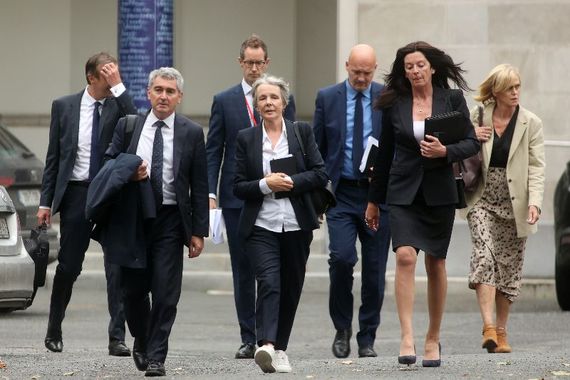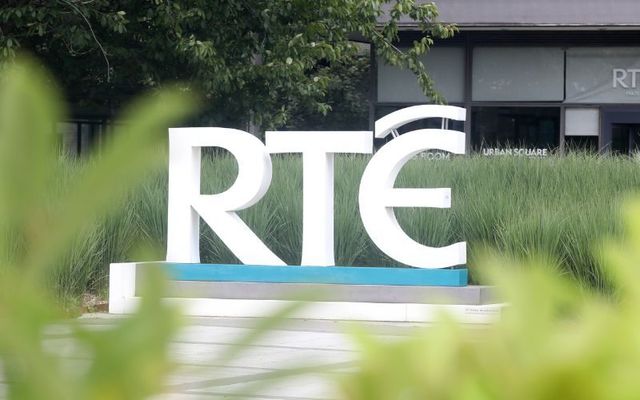How the mighty have fallen. From being perched on a pedestal where they felt the right to comment on all and sundry – and at times haughtily lecture the public – it is quite some journey for Ireland’s national broadcaster, RTÉ, from where they were to where they are now.
RTÉ's reputation is in tatters and serious questions are being raised about its continuing existence in its current form. The catalyst for this situation is the revelation that RTÉ's top earner, former "Late Late Show" host Ryan Tubridy, was paid €345,000 ($382,000) more than was declared publicly.
The money was paid in a circuitous route through a series of labyrinth transactions involving UK-based companies and anonymous invoices which were not visible to their internal financial accountants, the board of RTÉ, or government ministers. The intention clearly was to deceive and cover up these payments from a gullible public and political system that has for far too long stood in awe of RTÉ.
The network is funded by a public which, in this instance, it treated with disdain. RTÉ operates on a dual funding model, with roughly 55 percent of its income – almost €200 million a year – brought in by way of the license fee. The rest, €145 million, is generated through commercial revenues according to 2021 figures.
The license fee, €160 annually, is paid by every single homeowner or business premise with a TV on-site. There are fines of up to €1,000 if you don’t pay this amount on a first conviction and double that for subsequent offenses along with a prison term. There have been concerns about RTÉ's funding model and financial transparency, and there have been debates about the fairness and sustainability of this funding mechanism.
Additionally, critics have called for more clarity regarding RTÉ's expenditure and budget allocation. The network has gotten greedy lately by introducing pay-per-view for some GAA games and using its huge purchasing power to muscle in on live shows such as Christmas pantomimes.
But to fully understand the impact of the latest scandal you need to understand the influence RTÉ has in Ireland, the respect with which we regard "The Late Late Show," and finally the iconic status Tubridy has – or should that be had?

Ryan Tubridy, former host of "The Late Late Show." (RollingNews.ie)
Traditionally, RTÉ has been regarded as a trusted source of news and information. It has a long-standing history of providing news and current affairs coverage across both television and radio broadcasts as well as having a substantial online footprint.
As the national public broadcaster, it is generally seen as reliable and objective. For instance, a 2021 survey found that it was the most reliable news source for Irish consumers, with 78 percent of respondents saying they trusted it.
Now that trust has gone. A snap opinion poll carried out for the Irish Mail on Sunday found that 70 percent of those questioned said that RTÉ would not be able to regain their trust.
The executives in charge have so many questions to answer but have suddenly gone camera-shy. The director general, essentially the CEO, was on holidays when the story broke and was suspended by the board even though she was due to finish out her contract in a matter of weeks, and then “resigned with immediate effect.”
A convenient scapegoat and all very opportune if the last thing you want to do is to answer questions, and there are a lot of questions, not least why incorrect information was given to elected politicians when the top salaries at RTÉ were questioned last year.
There may also be legal ramifications in relation to the published accounts which did not paint “a true and fair” picture of the company.
But we know other executives were also involved in this deception, and there are serious question marks about a finance function that allowed such a large sum of money to swirl around in the organization without proper accounting procedures being in place.
And what about a board that apparently did not ask the hard questions over a five-year period. Are they fit for purpose?

June 28, 2023: RTÉ Board members leaving Leinster House after the Oireachtas Media Committee. (RollingNews.ie)
Also dragged into this row is "The Late Late Show" which since its first episode in July 1962 has been a cultural institution in Ireland, with a remarkable influence on social issues and current affairs, often sparking nationwide conversations, debates, and controversies.
A TV talk show airing every Friday night that resonates with viewers, it has had only three presenters in its long history. It was a mirror reflecting the changing face of Irish society.
It did this by tackling sensitive topics as well as providing light entertainment once a week. It cut through the confusion to get to the nub of an issue.
Now it is part of the story and awaits its new host, Patrick Kielty, in September. It will probably survive the scandal, but new light is being cast on why Tubridy resigned as the host in March.
Also, suspicions have been raised as to why no current RTÉ personality was considered for the role. Are there other financial skeletons to be found?
For Tubridy, it has been a spectacular fall from grace. His last show had President Michael D. Higgins extolling his virtues. All quite embarrassing now for Higgins, whose judgment on a number of matters recently has let him down badly.
President Higgins will appear on tonight's @RTELateLateShow, where he will be interviewed as part of Ryan Tubridy's final show as host pic.twitter.com/r2SestM1Oz
— President of Ireland (@PresidentIRL) May 26, 2023
Bono turned up to present Tubs, as he is affectionately known, with a Vespa motorcycle as a sign of gratitude for his work on "The Late Late Show" over 14 years. As if he wasn’t paid enough!
Media commentators fell over themselves at the time to eulogize Tubs. Their copy hasn’t aged well.
Tubs has had a charmed media life that wasn’t harmed by his close relationship with a number of powerful Fianna Fáil politicians. During Covid, he came into his own, effectively becoming the trusted face of Ireland’s response, at times encouraging, advising, warning but always rallying the public.
It was public broadcasting at its best. But all that is tarnished now with his mantra of “we are all in this together” sounding particularly hollow.
So what will be the fallout? Hard to know at this stage, but it’s clear that heads will roll and there will be a public campaign to abolish or at least reduce the license fee.
They have had it their own way in RTÉ for too long and it's time the broadcaster competed with the private sector on a level playing field. Public broadcasting is necessary, but let it be shared around.
To a generation brought up on "The Late Late Show," there is a certain irony to that well-known jingle that introduced each episode – “it started on The Late Late Show.” But now, where will it all finish?
*This column first appeared in the June 28 edition of the weekly Irish Voice newspaper, sister publication to IrishCentral. Michael O'Dowd is brothers with Niall O'Dowd, founder of the Irish Voice and IrishCentral.




Comments